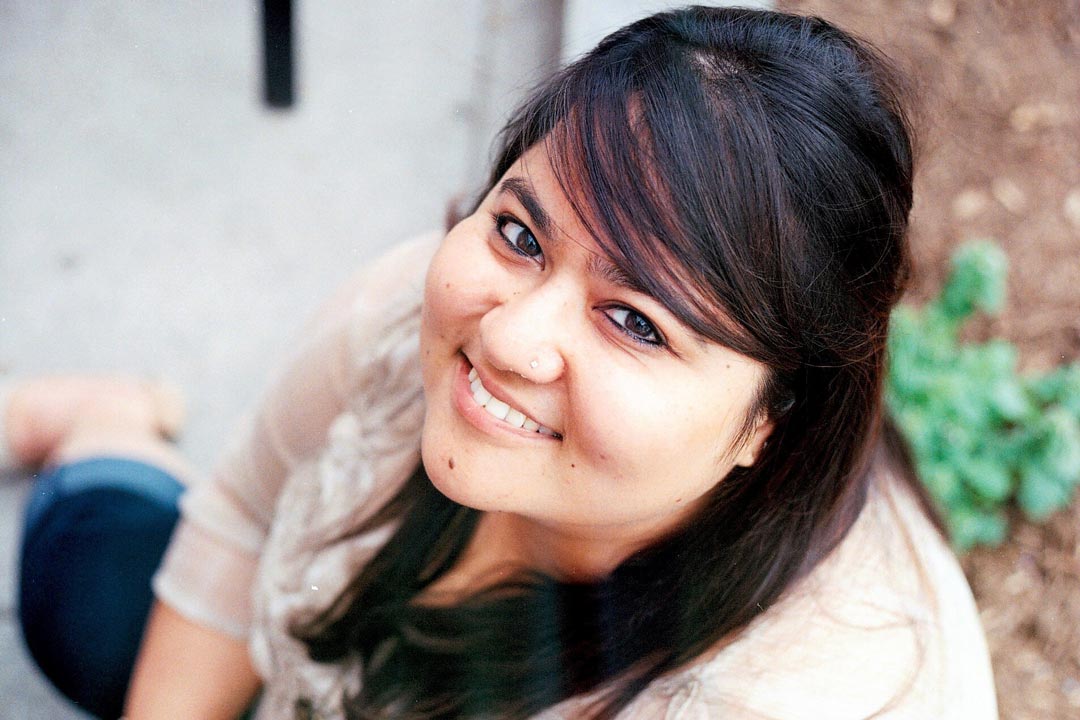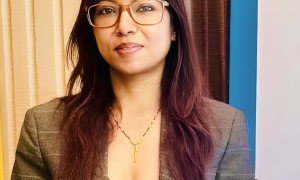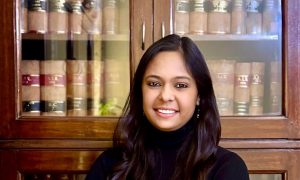Neha Bhat is currently working as an Associate Durable Solutions Officer at United Nations High Commissioner for Refugees. She graduated from WBNUJS, Kolkata in 2007 and had studied further at American University, Washington College of Law. She has specialised in International Organisations, International Human Rights Law and Migration Law and Policy. Without much ado, let’s delve right into her choice to do an LL.M and pursue International Human Rights.
We asked her to share:
- Strategies on selecting an university for LL.M
- Information of Faculty and Facilities of Washington College of Law
- Applying for Scholarships at WCL
What was your motivation behind doing LL.M.? When did you finally decide that you needed to do masters?
I have always wanted to pursue further studies. Even when I was in my final year at NUJS, I was sure that I will complete my masters and subsequently get an advanced degree- you know MPhil or PhD or the like. I genuinely like reading and getting to know subjects and issues. I really enjoy exploring areas of law that I don’t really have much experience in and an LL.M program helps me exactly with that.
Since you are into the academic arena, you are either writing or researching and reading and that really works well with me. Eventually, later in life I want to teach and therefore I knew I would always have to finish my LL.M and then an advanced degree. But I wanted to have work experience before I joined the Masters degree- that was also because while at NUJS, I hadn’t really done much- I had no serious publications, wasn’t at the top of my class, wrote a really horrible statement of purpose– end result, I didn’t get admitted for my LL.M to any of the places I applied to. Plus I also realised I knew, rather understood very little of things and therefore I realised I needed some good, in depth work experience before pursuing my LL.M.
So I joined SEBI as a Legal Officer, worked there for about 2.5 years and then went and joined the UN High Commissioner for Refugees in Delhi, where also I worked for almost another 2.5 years. After 5 years, I felt I had a very good idea of what I wanted to focus my LL.M on and even had ideas about further studies- like PhD proposal and the like, and therefore decided to come and get my LL.M degree. Also, my work at the UNHCR was very intense. I loved my work very much, I still love my work very much and I would definitely hope to get an opportunity to work with UNHCR- but I realised that you need to know when to “step back” so you don’t unconsciously burn yourself out. And after 2.5 years, I knew I had reached that point, where I was on the path to burning out in my work.
 How did you choose the university/ college? How should one go about choosing a university?
How did you choose the university/ college? How should one go about choosing a university?
Selecting a University can be one of the most difficult things to do and if not done properly, you could end up feeling a little miserable about your choice. I have had the opportunity to put myself through the LL.M application process three times- once in my final year at NUJS, then in 2008/09 and then finally in 2010/11. When I was at NUJS, in hindsight, I made some of the worst application decisions– I remember applying ONLY to Harvard, California Berkeley, NYU (for the NYU-NUS programme) and Oxford. No other place.
The problem with my applications was that my Statement of Purpose wasn’t right, and I had no research plan in place, I wanted to do an LL.M because it seemed the “right thing to do” and not because I knew what I wanted to study or why I wanted to do. Obviously, it didn’t work- I was rejected by all universities I applied to. I did panic a bit, thinking maybe I was very bad at this and maybe academics weren’t for me. It was the same time when I had sat for the Rhodes scholarship regional interview in Kolkata, but failed to make it to the National rounds. So it was like a culmination of bad results.
The second time I applied, I was working with SEBI. In this round, I managed to apply to 3 places, before I came down with chicken pox. I applied to California Berkeley, again to NYU (for the NYU-NUS) programme and also to Stanford. Again, NYU turned me down. Since one of my referees didn’t submit my reference letter for Stanford, my application was incomplete so I was left out of the loop. But this time, I was waitlisted for Berkeley in the first tranche of waitlisted applicants out of some 950 odd people. It was a big moment for me. I had been working long enough at SEBI to know I was not going to study corporate law, so my statement of purpose focused on my desire to teach law and consciously I decided to veer away from corporate law. But eventually I didn’t get through. It was then I decided that I had to get back into the field I wanted to do my LL.M in and thus my job change happened. Eventually in 2010/11, I applied to 6 programs and was admitted to all but one– at LSE. The programs I was admitted to, were regionally, the best for Human Rights– NUS- Singapore, Berkeley-California (yes, again), McGill- Toronto, Warwick- UK and American University- Washington DC.
I consciously decided to veer away from the very “top” rung places– because I STILL didn’t have (or so I felt, and still continue to feel) any meaningful academic publications etc. or what I felt, a superlative proposal which would ensure admission in these universities. Plus, I was looking at a taught masters program and therefore chose places which did not mandate a compulsory dissertation component.
I also looked at the field specializations ranking and faculty strength rather than the overall ranking of the school because those are often better indicators of the specific program. So for example, I know that Warwick has a very solid International Human Rights Law program. American University, where I am currently studying does not necessarily come out on top of law school rankings in the US, but its International law program is ranked higher than Berkeley. Plus, it’s the ONLY law school in the US, where you can have the opportunity to study with Special Rapporteurs – past and present. For e.g. I have had the opportunity to study with some really big names in international law, Prof. Juan Mendez who taught me Advanced Human Rights, is the current Rapporteur for Torture. I also studied under Prof. Robert Goldman, who was the previous (and the first) UN Rapporteur on Human Rights and Terrorism. And I also studied under Prof. Diane Orentlicher, who has drafted various UN Guidelines and Standards including on Combating Impunity. I am also lucky that I have the opportunity now to work with her as a research assistant/ dean’s fellow- I started on this position in June and continued working with her till December 2013.
It’s been one amazing experience- to delve into interesting issues of transitional justice, international criminal law etc. These are factors which make a big difference to me and I think should make a difference to everyone considering a specialisation at the LL.M stage – you should know which fields you are interested in and if the university you are applying to, has professors who teach and/or conduct research in those areas or not. Also, the cost of the program matters a lot– and whether there are scholarships etc. on offer or not. American University has tuition remissions and full tuition + fee scholarships on offer and I was one of the recipients of their Alumni Fund Scholarship (which covers tuition for 24 credits plus all school fees) and for me that was a swinging factor. My top two choices were American or California Berkeley, but the latter didn’t offer me any scholarship. Plus what kind of city you want to live in- for me, Washington DC is a dream because there are so MANY events on International Relations and Affairs which happen here- I get an opportunity to meet people and again gain knowledge. These are opportunities not many cities can offer.
What did you study? Why did you decide to take this particular subject?
I am enrolled in a dual degree program at American University. So on completion of 40 credits, I will be conferred with two degrees, the first one is the LL.M in International Legal Studies, which I completed on May 19 (24 credits) with a specialization in International Human Rights Law. My second degree, which starts shortly, is called the LL.M in Law and Government and my area specialization is Regulatory and Administrative Law. I have 16 more credits to finish so I will be completing courses in International Trafficking, Women and Conflict, Global Warming Law and Policy etc. I think it is worthy to invest time, energy and effort into these courses because it offers me further exposure to theory I would need to know, but I may not necessarily get around to studying/ reading on my own. I need to be constantly motivated to do something, and unless there is a personal investment (time or money etc.) I know that I will not be driven to do anything.
How is your experience so far? Tell us about the faculty and facilities. Anything memorable that is stuck in your mind?
My experience so far has been fantastic. As I mentioned before, I have had the opportunity to study and work with some of the best known legal minds in my chosen area of law and I don’t think any other experience could be better than this. What I genuinely like in the American academic setting and which is missing in the Indian academic setting is the quality of feedback that you can get from Professors – and if you demonstrate capability to take up new issues, areas of research- they encourage you and offer guidance.
I have maintained an academic profile at www.ssrn.com, which is an online repository of academic articles and research. And I have often been contacted for some of the projects I am undertaking/ have worked on by people pursuing their PhD and in one instance, Prof. Alston @NYU. And I think these avenues- contact with academics, renowned academics is not available/ not facilitated everywhere- either we are too shy, too inhibited or simply too worried that we do not match the intellectual calibre of our counterparts- and that, as I have come to realise, is a lot of garbage.
If you have the good luck of studying with Prof. Mendez, he will also perhaps mention sometime that he really enjoys watching Without A Trace, an engaging and absorbing law enforcement series where missing people are tracked down. You will have engaging debates with your classmates on whether the R2P doctrine should be applied in Syria and have the privilege of being one of the chosen few to ask Prof. Theodor Meron, the President of the Intl. Criminal Residual Mechanism for the ICTY and ICTR a question on the future of international criminal law and beyond. Plus there are a lot things that keep happening in DC, like between January- May, 2013 I Was part of the UN Association of the Washington DC (UNA-(N)ational (C)apital (R)egion)’s Graduate Fellow and met individuals like Frank Vogl, of Transparency International, D. Bosco- who writes the Multilaterialist blog at Foreign Policy etc.
For the scholarship recipients, there are annual dinners as well- 2-3 where you get to meet alumni. American also hosts an annual Embassy Dinner, where you get to meet delegates and staff members from various Embassies and Country Missions in DC- I was very lucky to meet, among others, Mr. Ahmad Haidari, the Cultural Attaché of the Afghanistan Embassy in DC.
How’s the Indian fraternity over there? Are there many Indian students?
Not many, at least not in the LL.M class. I guess it is also a function of specialization- American Uni. is famous for its international law programs and not business law/ commercial law. Many students who wish to do commercial/ corporate law programs, like financial and securities regulation or IP choose places like George Washington or Georgetown, which are also located in DC and have better known and better specialized programs in the specific fields. In the JD program however there are many American students of Indian origin.
How is the recruitment/ placement situation for overseas students?
It is difficult, but then again, it depends on what kind of job you are looking for. There is a program called the Optional Practice Training, which allows those holding F1 status to remain in the US after completion of their degree and work for a period of one year such placements could be either paid or unpaid. But if you want to work in a law firm, then you have to clear the Bar Exam- the eligibility guidelines for which are continuously revamped (esp. the NY Bar). So for e.g. you have to have 12 credits in courses relevant to the Bar Exam (contracts, family law, evidence, criminal procedure, ethics etc.). From 2015, all candidates for the NY Bar also need 50 hours of pro-bono work.
My point being, if your area of interest is not commercial/corporate law and if you are not interested in working in a law firm, the NY Bar may not exactly be a very good idea. First, of the 24 credits in an LL.M program, you will have to dedicate half the program to complete courses required for the Bar Exam- this could effectively prohibit you from getting a specialization. Plus, those who want to work with international organisations or NGOs etc., especially at the entry level may not need to clear the Bar exam- but that of course depends on the organization and is different for each organization. I have no idea about corporate/commercial law since that is not my area of interest. However, I do know that AU facilitates participation of LL.M students in the largest job fair which is annually held around March/April in New York and students can apply to work with law firms not only in the US but also in Europe and other areas/ countries.
How is the academic schedule? Is there a lot of academic work?
Depends on the classes you take and the Professor, to be very honest. Some professors can and do give upwards of 100 pages a week of reading and some professors may give only 10 pages a week or even less. If you are taking an end of semester exam, you need to have done the readings throughout the semester otherwise it will be impossible to catch up at the end of the semester. There are however courses where you are required to write papers- 20 pages is minimum but the maximum can be 35-40 pages as well- for e.g. I wrote a 44 page paper for the course I took with Prof. Goldman and a 30 page paper for my course with Prof. Mendez, but I also wrote at least 3-4 papers of upto 20 pages.
This was a conscious decision on my part– to choose courses where I would be required to write research papers than take exams, I want to build an academic profile and this is one of the best ways of doing it. But it may not be for everyone, especially if you find research, writing and editing/ footnoting cumbersome. For the LL.M in Intl. Legal Studies at American, you need to have completed 2 papers of 20 pages each in the subject in which you wish to specialize. Some professors will ease the norms of referencing and ask you to follow a ‘consistent’ format. But most require Bluebook format- which I guess every mooter knows is the most cumbersome task.
What about accommodation?
As an LL.M student, you have to arrange for accommodation yourself. Most people choose to share a room, or find a room in a house shared with other people. I like to live alone so I chose to take up residence in a studio apartment about 30 minutes walking distance from school. It’s very important to find a place which is conveniently located to public transport/ close to school for ease of access etc. My place is connected to the bus routes very well and within 20 minutes walking distance of the American’s shuttle stop and the Metro stops. It’s also very close to Georgetown and grocery stores, restaurants etc.
Tell us about your classmates – is there a pre-dominantly international crowd? What is the general age group of students?
Yes, a very diverse student body. In fact one of the main strengths of American’s LL.M program is the diversity of its student body. We have students from every continent and many, many countries and that makes the classes all the more interesting. I think the general age of students varies from 22-35, including Humphrey Fellows and other individuals on specialised programs, although a majority of the class is below 26 years.
How does one go about scholarships? Does the institute offer any scholarship?
Yes, American offers a lot of scholarships/ financial-tuition assistance. So there is the Alumni Fund Scholarship which covers tuition+ fee for 3-5 incoming students. But this scholarship is only available for those starting in the Fall Semester or in August each year. The tuition waivers work semester to semester and as required students can apply for them, based on eligibility etc. There is also a $4000 scholarship instituted by current dean, Dean Claudio Grossman which is awarded in the spring semester. Additionally, if you have participated in the American’s Inter-American Moot Court competition, you are eligible to apply for a scholarship. More details can be found at http://www.wcl.american.edu/ilsp/scholarly_competitions.cfm
Going forward, how do you expect this experience to influence your career?
I think one good thing that has come out of the LL.M program is that I have realised that there are lot many more areas of international law I am interested in- my specialty remains asylum and refugee law issues, but being in academics, allows you to explore your niche area in relation to other issues/ aspects of law. So you slowly start building a knowledge base in those alternate areas as well. And I think going forward, that can only be a good thing, because the more adaptable you are, the more diversified skills and knowledge you have, the more relevant and transferable your competencies will become. I also think that this exposure somehow makes it easier for me to break into field of transitional justice, international criminal law- because of the stalwarts I have studied under. They are the best guides, mentors and connectors one can have.


























